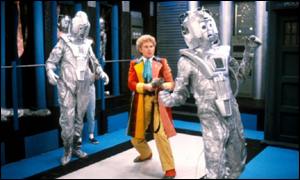| You are in: Entertainment: New Media | ||||||||||||||||||||||||||||||||||||||||||||
|
Thursday, 12 July, 2001, 23:24 GMT 00:24 UK
Time travelling with Doctor Who

Colin Baker confronts the Cybermen
As Doctor Who returns to the BBC in an online special BBC News Online travels through time to chart the history of the famous Time Lord.
There may be cobwebs on the Tardis these days but the time machine can still transport us back to the origins of Doctor Who in the furthest reaches of the BBC. In 1962, Time Lords, assistants, K-9, Daleks, Cybermen, the Master, sonic screwdrivers and Davros were all meaningless words to television viewers who were yet to be introduced to Doctor Who.
1960s William Hartnell's professorial, cantankerous Doctor first appeared on our screens on 23 November, 1963 and six more actors have played the Time Lord on TV since. When ill-health influenced Hartnell's decision to retire the producers hit upon the idea of continually re-casting the lead role, and the famous regeneration powers of the Doctor emerged.
He also helped establish the idiosyncrasies of the Doctor - which each new lead actor would create, adapt and add to over the years - and many of the themes of the character were introduced. The concept of the time lord and of his ancestry were introduced in plot lines during Troughton's era. 1970s But after three years in the role he stepped aside and made way for Jon Pertwee who brought a more dynamic and colourful edge to the series.
Ten years after the screen debut of Doctor Who, the three Doctors met up in an anniversary special but Pertwee bowed out in a story line which saw him bitten by a radioactive giant spider. Tom Baker took over in late 1974 and spent seven years as the time-traveller, bringing a lighter and wittier touch to proceedings, helped in part by the writing of Douglas Adams, the author of Hitchhiker's Guide to the Galaxy. Part of the charm and attraction of Doctor Who was the inventive use of monsters and villains and the Time Lord's companions in the series.
A highlight of Tom Baker's tenure was the introduction of K-9, his robot dog assistant with a killer laser in his snout. 1980s Tom Baker brought a more authoritative edge to the Doctor and played him as a genius, often distracted or irritated by the failings of others.
For the 20th anniversary the five doctors were reunited in a one-off BBC special and the BBC held a massive convention in Longleat House, Wiltshire. Colin Baker took over in 1984 and is described by the BBC Doctor Who website as the "most eloquent and poetic" of all the Doctors. But ratings for the show began to drop and after a hiatus in 1986 the programme was reduced to 14 episodes a year and a new Doctor was sought. Scottish actor Sylvester McCoy took over in 1987 but his reign was just two years.
1990s Many attempts to revive the series failed but hopes were raised in 1996 when Paul McGann took over the role for an Anglo-American TV movie. Despite criticisms that the Time Lord had been Americanised it was received well in the UK with more than nine million viewers but it went down poorly in the US and plans for a spin off series were shelved.
Death Comes to Time is the first original and authentic Doctor Who story for five years with Sylvester McCoy back at the helm of the Tardis. Time, it would seem, never stands still for Doctor Who.
|
See also:
Internet links:
The BBC is not responsible for the content of external internet sites Top New Media stories now:
Links to more New Media stories are at the foot of the page.
|
||||||||||||||||||||||||||||||||||||||||||
|
Links to more New Media stories
|
|
|
^^ Back to top News Front Page | World | UK | UK Politics | Business | Sci/Tech | Health | Education | Entertainment | Talking Point | In Depth | AudioVideo ---------------------------------------------------------------------------------- To BBC Sport>> | To BBC Weather>> ---------------------------------------------------------------------------------- © MMIII | News Sources | Privacy |
|